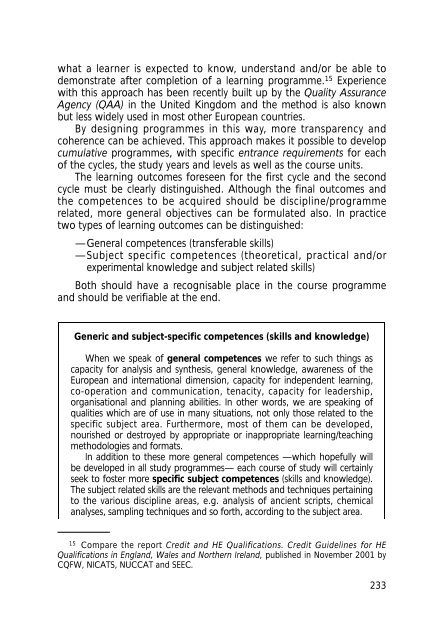Final Report Pilot Project - Relaciones Internacionales de la ...
Final Report Pilot Project - Relaciones Internacionales de la ...
Final Report Pilot Project - Relaciones Internacionales de la ...
Create successful ePaper yourself
Turn your PDF publications into a flip-book with our unique Google optimized e-Paper software.
what a learner is expected to know, un<strong>de</strong>rstand and/or be able to<br />
<strong>de</strong>monstrate after completion of a learning programme. 15 Experience<br />
with this approach has been recently built up by the Quality Assurance<br />
Agency (QAA) in the United Kingdom and the method is also known<br />
but less wi<strong>de</strong>ly used in most other European countries.<br />
By <strong>de</strong>signing programmes in this way, more transparency and<br />
coherence can be achieved. This approach makes it possible to <strong>de</strong>velop<br />
cumu<strong>la</strong>tive programmes, with specific entrance requirements for each<br />
of the cycles, the study years and levels as well as the course units.<br />
The learning outcomes foreseen for the first cycle and the second<br />
cycle must be clearly distinguished. Although the final outcomes and<br />
the competences to be acquired should be discipline/programme<br />
re<strong>la</strong>ted, more general objectives can be formu<strong>la</strong>ted also. In practice<br />
two types of learning outcomes can be distinguished:<br />
—General competences (transferable skills)<br />
—Subject specific competences (theoretical, practical and/or<br />
experimental knowledge and subject re<strong>la</strong>ted skills)<br />
Both should have a recognisable p<strong>la</strong>ce in the course programme<br />
and should be verifiable at the end.<br />
Generic and subject-specific competences (skills and knowledge)<br />
When we speak of general competences we refer to such things as<br />
capacity for analysis and synthesis, general knowledge, awareness of the<br />
European and international dimension, capacity for in<strong>de</strong>pen<strong>de</strong>nt learning,<br />
co-operation and communication, tenacity, capacity for lea<strong>de</strong>rship,<br />
organisational and p<strong>la</strong>nning abilities. In other words, we are speaking of<br />
qualities which are of use in many situations, not only those re<strong>la</strong>ted to the<br />
specific subject area. Furthermore, most of them can be <strong>de</strong>veloped,<br />
nourished or <strong>de</strong>stroyed by appropriate or inappropriate learning/teaching<br />
methodologies and formats.<br />
In addition to these more general competences —which hopefully will<br />
be <strong>de</strong>veloped in all study programmes— each course of study will certainly<br />
seek to foster more specific subject competences (skills and knowledge).<br />
The subject re<strong>la</strong>ted skills are the relevant methods and techniques pertaining<br />
to the various discipline areas, e.g. analysis of ancient scripts, chemical<br />
analyses, sampling techniques and so forth, according to the subject area.<br />
15 Compare the report Credit and HE Qualifications. Credit Gui<strong>de</strong>lines for HE<br />
Qualifications in Eng<strong>la</strong>nd, Wales and Northern Ire<strong>la</strong>nd, published in November 2001 by<br />
CQFW, NICATS, NUCCAT and SEEC.<br />
233


